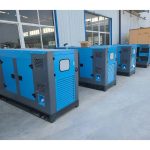The Ultimate Guide to Diesel Generators for Continuous Operation

Introduction
Diesel generators have been a reliable source of power for various applications, especially in situations where a continuous power supply is essential. These generators are known for their durability, efficiency, and ability to provide uninterrupted power for extended periods. In this comprehensive guide, we will explore the key features, advantages, applications, and best practices for using diesel generators for continuous operation.
Chapter 1: Understanding Diesel Generators
Diesel generators are power generation units that operate using diesel fuel to produce electricity. They consist of an engine, alternator, fuel system, cooling system, and control panel. The engine is the key component of the generator, as it burns diesel fuel to generate mechanical energy that drives the alternator, which then converts it into electrical energy.
150kw diesel generator for event management of the main advantages of diesel generators is their fuel efficiency. Diesel fuel has a higher energy density compared to gasoline, which means that diesel generators can produce more power using less fuel. This makes diesel generators a cost-effective solution for continuous operation where fuel consumption is a critical factor.
Chapter 2: Key Features of Diesel Generators for Continuous Operation
1. Continuous Power Output: Diesel generators are designed to provide a continuous power supply without any interruptions. They can run for extended periods without overheating or experiencing performance issues, making them ideal for applications that require a constant source of power.
2. Durability and Reliability: Diesel generators are known for their robust construction and reliability. They can withstand harsh operating conditions, temperature extremes, and heavy loads without compromising their performance. This makes them a preferred choice for critical applications such as hospitals, data centers, and industrial facilities.
3. Low Maintenance Requirements: Diesel generators have fewer moving parts compared to other types of generators, resulting in lower maintenance requirements. Regular servicing and preventive maintenance are essential to ensure optimal performance and longevity of the generator.
4. Quick Start-up Time: Diesel generators have a quick start-up time, allowing them to provide power within seconds of a power outage. This feature is crucial for applications where downtime is not an option, such as emergency response operations and mission-critical facilities.
Chapter 3: Advantages of Using Diesel Generators for Continuous Operation
1. Cost-Effective: Diesel fuel is generally more affordable than other types of fuel, making diesel generators a cost-effective solution for continuous operation. The fuel efficiency of diesel generators also contributes to lower operating costs in the long run.
2. Reliable Power Supply: Diesel generators are known for their reliability and ability to provide uninterrupted power supply. They can operate continuously for days or even weeks, ensuring that critical operations are not disrupted during power outages or emergencies.
3. Easy Availability of Fuel: Diesel fuel is widely available worldwide, making it easy to refuel diesel generators even in remote locations. This accessibility ensures that the generator can be quickly refueled to maintain continuous operation without any downtime.
4. Longevity and Durability: Diesel generators are built to last and can operate for thousands of hours without experiencing significant wear and tear. Their robust construction and high-quality components make them a reliable choice for continuous operation in demanding environments.
Chapter 4: Applications of Diesel Generators for Continuous Operation
1. Emergency Backup Power: Diesel generators are commonly used as emergency backup power sources for critical facilities such as hospitals, data centers, telecommunications infrastructure, and government buildings. These generators ensure that essential services remain operational during power outages or natural disasters.
2. Remote Off-Grid Locations: Diesel generators are ideal for providing power in remote off-grid locations where access to the main power grid is limited or unavailable. They are commonly used in mining camps, construction sites, oil and gas facilities, and rural communities to meet the energy needs of the site.
3. Industrial and Manufacturing Facilities: Diesel generators are widely used in industrial and manufacturing facilities to provide a reliable source of power for critical equipment and machinery. These generators ensure uninterrupted production and prevent costly downtime due to power failures.
4. Events and Entertainment: Diesel generators are commonly used to power outdoor events, concerts, festivals, and film productions where access to the main power grid is limited. These generators provide a reliable and portable power solution to meet the energy demands of the event.
Chapter 5: Best Practices for Operating Diesel Generators Continuously

1. Regular Maintenance: Schedule regular maintenance checks and servicing to ensure that the diesel generator is in optimal condition for continuous operation. This includes checking fuel levels, oil levels, coolant levels, and inspecting the engine components for any signs of wear or damage.
2. Fuel Quality: Use high-quality diesel fuel to prevent contamination and ensure optimal performance of the generator. Store fuel in a clean and dry environment to prevent water and dirt from entering the fuel system, which can damage the engine.
3. Load Management: Properly manage the load on the generator to prevent overloading and ensure efficient operation. Avoid sudden changes in load and ensure that the generator is capable of handling the power requirements of the connected equipment.
4. Monitoring and Control: Install a monitoring and control system to track the performance of the generator, including fuel consumption, engine temperature, oil pressure, and voltage output. This system can alert operators to any issues or abnormalities that may require immediate attention.
Chapter 6: Conclusion
In conclusion, diesel generators are a reliable and efficient solution for continuous operation in a variety of applications. Their durability, fuel efficiency, and ability to provide uninterrupted power make them an ideal choice for critical facilities, remote locations, industrial operations, and events. By understanding the key features, advantages, applications, and best practices for operating diesel generators, users can ensure reliable power supply even in the most demanding conditions.
